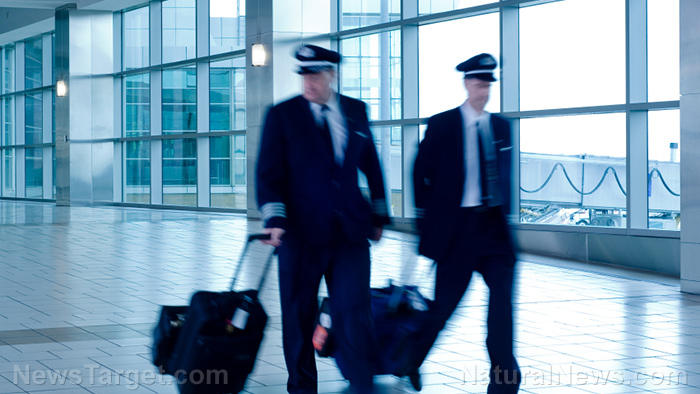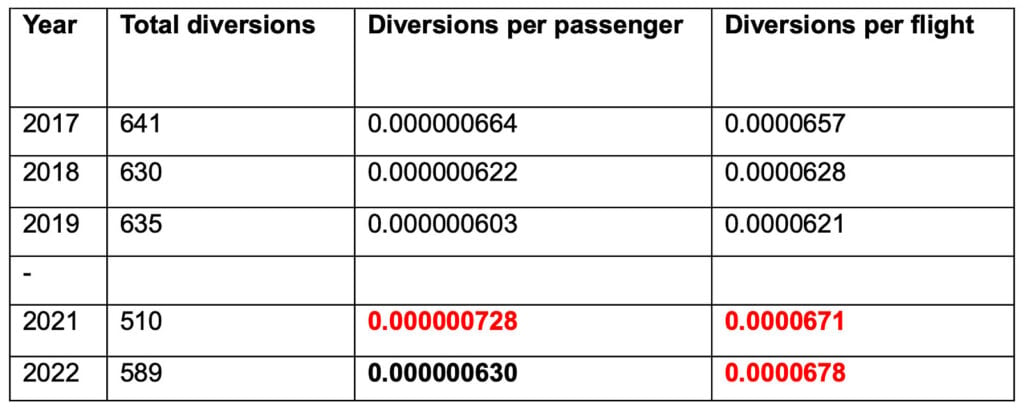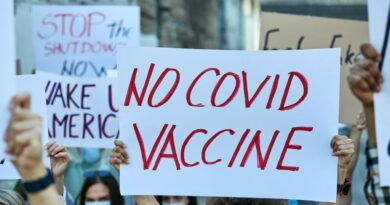Exclusive: FAA granted medical clearance to pilot with history of ‘possible’ vaccine-induced myocarditis

Editor’s Note: This article is Part 1 in a two-part series on the impact of COVID-19 vaccines and vaccine mandates on airline safety in the U.S.
(Article by Michael Nevradakis, Ph.D. republished from ChildrensHealthDefense.org)
The Federal Aviation Administration (FAA) issued a first-class medical clearance to a pilot whose medical history includes “possible” vaccine-induced myocarditis, according to a letter leaked anonymously by a pilot.
This letter was leaked amid recent revelations the FAA is prioritizing keeping pilots in the air at the expense of the safety of pilots, passengers and the general public.
FAA data indicate the number of medical flight diversions increased in 2021 and 2022, compared to 2019 and prior.
Other documents reveal that in 2021, the FAA strongly recommended, in writing, pilots receive the COVID-19 vaccines issued under an emergency use authorization (EUA), despite the agency’s own regulations prohibiting pilots from taking medications or therapeutics that have been on the market for 12 months or less.
Pilot cleared to fly despite ‘possible’ vaccine-induced myocarditis
The leaked letter — with names and dates redacted — issuing a first-class medical certificate to a pilot with a history of “possible” vaccine-induced myocarditis — originated from the FAA’s Civil Aerospace Medical Institute in Oklahoma City.
According to the letter:
“You are cautioned to abide by Title 14 of the CFR’s, Section 61.53, relating to operations during medical deficiency.
“Because of your history of possible Vaccine induced Myocarditis, Hyperlipidemia, Ganglion Cyst removal Left Hand, and Knee pain, operation of aircraft is prohibited at any time new symptoms or adverse changes occur in your health status.”
The FAA has admitted to an airline pilot that his myocarditis was “possibly” vaccine induced. Yet, without further investigation, they continue to jeopardize the saftey of air travel and the health of pilots by pushing non FDA approved injections against their own aeromedical… pic.twitter.com/bQMEIluJqe
— Josh Yoder (@JoshYoder) March 15, 2023
According to WebMD, “Myocarditis often has no symptoms.” Johns Hopkins Medicine states that acute myocarditis can develop “suddenly,” while according to Empendium, the onset of myocarditis may be “sudden,” with “factors causing autoimmune reactions to allergens” — such as vaccines — listed as a common cause of this condition.
Yet despite this, and despite the pilot’s other medical issues, the FAA said: “Our review of your medical records has established that you are eligible for a first-class medical certificate.”
A November 2022 University of Basel study that examined individuals who had received a COVID-19 booster shot found “elevated cardiac troponin levels in a higher percentage of vaccinated individuals than expected,” and “evidence of temporary mild damage [myocarditis] to cardiac cells” in 2.8% of the patients — “instead of the anticipated 0.0035%.”
According to cardiologist Dr. Christian Müller, one of the study’s authors, even such mild damage could potentially become more serious with time, especially with the administration of annual COVID-19 boosters:
“So there’s slight damage to heart muscle cells in almost 3% of the cases, which shouldn’t be overestimated, but also not ignored. …
“According to current knowledge, the cardiac muscle can’t regenerate, or only to a very limited degree at best. So it’s possible that repeated booster vaccinations every year could cause moderate damage to the heart muscle cells.”
According to the FAA, a first-class medical certificate generally “is designed for the airline transport pilot,” while “second-class [is] for the commercial pilot, and third-class for the student, recreational and private pilot.”
This clearance may be the first time the FAA openly acknowledged a vaccine injury, such as vaccine-induced myocarditis, in a pilot.
In a Jan. 24 report, Federal Air Surgeon Susan Northrup, M.D., M.P.H., said the FAA has seen “no evidence” of COVID-19 vaccine injuries that led to “aircraft accidents or pilot incapacitations.”
And in February, Northrup told The Epoch Times she was “aware of only four potentially vaccine-related adverse events in active pilots.” Of these, “only one [pilot] has provided medical documentation through the normal process,” according to Northrup. She did not describe what the “normal process” is.
However, in April 2022, the FAA and Northrup were made aware of several incidences of vaccine injury in pilots that occurred as early as December 2021, via a hand-delivered letter to the FAA and other federal agencies, including the U.S. Department of Transportation, from the California-based Advocates for Citizens’ Rights.
The letter included data showing pilots across the aviation industry — including commercial, military and general aviation pilots — face increased health risks from the COVID-19 vaccines due to the unique nature of their profession.
The letter referred to specific incidents, including the case of an agricultural pilot, Cody Flint, who nearly blacked out while flying but managed to land his plane safely — although he has no recollection of how he did it.
In an interview with The Defender in May 2022, Flint said the incident occurred two days after he received his first and only dose of the primary series of the Pfizer-BioNTech vaccine in February 2021.
He was diagnosed with left and right perilymphatic fistulas (a lesion in the inner ear), and highly elevated intracranial pressure due to swelling in his brainstem.
“My intracranial pressure had risen so high that it caused both of my inner ears to ‘blow out,’” Flint said. Doctors told him this is usually caused by major head trauma.
A Jan. 27 letter from Sen. Ron Johnson (R-Wis.) to Northrup listed four pilots, including Flint and an air traffic controller who suffered severe adverse events soon after receiving a COVID-19 vaccine.
American Airlines Captain Bob Snow, coerced to vax (jab or job), suffered a heart attack 6 mins after landing in Dallas, April 9th. He speaks out.
All Canadian airline pilots were coerced exactly the same. Contact Cdn Airline execs & Transport Canada if you have concerns. pic.twitter.com/nJhCqhAuIz
— Free to Fly (@freetoflycanada) April 19, 2022
One of the pilots, Wil Wolfe, suffered a seizure and died 13 days after receiving the Johnson & Johnson COVID-19 vaccine. Bob Snow suffered sudden cardiac arrest immediately after landing a passenger jet at Dallas-Fort Worth International Airport, and Greg Pierson suffered atrial fibrillation within 24 hours of receiving the Pfizer-BioNTech vaccine.
Hayley Lopez, an air traffic controller, sustained serious adverse events within minutes of receiving her first dose of the Pfizer-BioNTech COVID-19 vaccine, and was ultimately diagnosed with postural orthostatic tachycardia syndrome, commonly referred to as POTS.
‘Keeping pilots in the air’ — at the expense of safety?
An August 2021 interview with Courtney Scott, D.O., M.P.H., published in the Federal Air Surgeon’s Medical Bulletin, may shed light on why the FAA may be brushing off vaccine-related adverse events in pilots and issuing medical certificates despite a pilots’ histories of vaccine injury.
Scott, who worked with the FAA for over a decade and is acting manager in the agency’s Aerospace Medical Certification Division, said at the time, the goal was to keep pilots in the air instead of grounding them when medical risks were identified, as long as the agency could “do so safely.”
Scott said:
“There has been a shift in the goal of aerospace medicine standards from preventing airmen with certain medical conditions from flying, to allowing some airmen with certain medical conditions to fly after mitigating the risks. This mitigation, which we can call aeromedical disease management, is what makes the role of AMEs [aviation medical examiners] so important, helping to identify and assess risk.
“AMEs are essential to getting and keeping pilots in the air. Occasionally, pilots can see the AMEs as an adversary because sometimes in the mind of a pilot, the goal of an AME is to stop them from flying. This attitude goes with the old aeromedical focus of not allowing anyone to fly if they have certain medical conditions. Now the goal is to get the pilot flying if they can do so safely.”
It’s unclear if this is official FAA policy. However, recent actions by the agency, ranging from the loosening of its electrocardiorgram (EKG) limits to the granting of a first-class medical certificate to a pilot with “possible” vaccine-induced myocarditis, suggest a willingness on the part of the FAA to accept loosened medical standards in allowing pilots to fly.
COVID vaccine injuries contributing to more flight diversions, pilot shortage?
In response to a Freedom of Information Act (FOIA) request filed Feb. 24 by the US Freedom Flyers, an advocacy organization that opposes vaccine mandates for pilots, the FAA provided data regarding “the number of airplanes that had to divert for medical emergencies from 2017 through the present.”
The raw data provided by the FAA indicate a decrease in 2021 and 2022, compared to the years 2017 through 2019, as flight activity was ramped up following the strong restrictions of 2020. Between 2017 and 2019, annual diversions for medical reasons ranged from 630 to 641. The figure was 510 in 2021, and 589 in 2022.
However, when calculated as a proportion of the number of flights and number of passengers carried in the U.S. annually, the figures tell a different story. The FAA did not provide these data, but the Bureau of Transportation Statistics does.
The data show that pre-pandemic, in 2018 and 2019, domestic and international passenger traffic in the U.S. exceeded 1 billion. In 2021, that number barely exceeded 700 million, and reached 935.4 million in 2022.
Flight movements similarly decreased compared to pre-2020 levels. Total domestic and international flights in the U.S. exceeded 10 million in 2018 and 2019. They totaled 7.6 million in 2021 and 8.7 million in 2022.
As a result, the data show that, on a per-flight basis, the percentage of flights diverted for medical reasons increased in both 2021 and 2022 compared to pre-2020 levels. Similarly, the percentage of diversions as a percentage of total passenger movements sharply increased in 2021, while the 2022 figure exceeded that of 2018 and 2019.
Notably, 2021 and 2022 were the years the COVID-19 vaccine was made available and widely distributed to the public.

Also potentially playing a role in the FAA’s rule changes and its apparent increased tolerance for pilots’ medical issues is an ongoing pilot shortage.
According to a July 2022 report by Oliver Wyman Insights, “an impending pilot shortage was on the horizon” in early 2021, and is now materializing, due to an aging workforce and mandatory retirement age of 65, and “a wave of early retirements at the height of the pandemic” — the the report didn’t specify a reason for the wave.
Snow confirmed for The Defender the growing shortage of pilots in the U.S., noting that “former military aviators are a traditional source of pilots for the airlines, but the military no longer produces pilots in large numbers, so there is now a shortfall.”
“The airline industry does not seem as attractive to the younger generation as with prior generations,” Snow added.
The airline industry may tacitly be making the same admission. According to a Dec. 8, 2022, report by CBS News:
“There’s language in a new bill now introduced in Congress — the Federal Aviation Administration reauthorization bill — asking the Federal Aviation Administration to reconsider part 121 and to allow the use of a single pilot operation, first in cargo aircraft.”
According to CBS News, the airline industry is lobbying for this move, as it would “lower costs and ease pressure from crew shortages.”
The FAA is facing Congressional reauthorization this year, as its previous five-year authorization, passed in 2018, is set to expire. No reauthorization bill appears in a Congressional web search as of today, but it is expected that a bill will formally be introduced within the calendar year.
Globally, more than 40 countries, including the U.K., Germany and New Zealand, have also lobbied the International Civil Aviation Organization (ICAO), a U.N. body, to codify the one-pilot change in international regulations.
The European Union Aviation Safety Agency also supported the revision, although in February, it postponed this rule change in Europe. Canada rescinded its rule requiring two pilots to be present in the cockpit at all times, in 2017.
Illustrating the potential dangers of one-pilot crews, Canada previously adopted its two-pilot rule following the deliberate crash of Germanwings Flight 4U 9525 in March 2015. When the flight’s captain exited the cockpit, presumably to take a bathroom break, the first officer locked him out of the cockpit and proceeded to intentionally crash the plane into the Alps. All passengers and crew were killed.
Current FAA regulations require two-pilot crews on commercial flights.
FAA, in recommending COVID vaccination, violated its own regulations
In a May 25, 2021, “Safety Alert for Operators” (SAFO), the FAA strongly recommended that pilots, crew members and aviation industry employees get the COVID-19 vaccines — indicating, in writing, that the agency violated its own regulations in the process.
The SAFO stated:
“Crewmembers are encouraged to get a COVID-19 vaccine. Those who hold an FAA-issued airman medical certificate must comply with any applicable medical requirements following vaccination. Crewmembers are encouraged to share their vaccine status with their employer’s occupational health program.
“COVID-19 vaccines authorized for emergency use by the U.S. Food and Drug Administration (FDA) are available across the United States, and everyone 16 years of age and older is eligible to get a COVID-19 vaccination.
“These vaccines are effective against COVID-19, including severe disease, and a growing body of evidence suggests that fully vaccinated people are less likely to have asymptomatic infection or to transmit SARS-CoV-2 to others, although further investigation is ongoing.
“Wide-spread vaccination is a critical tool to help stop the pandemic, and air crewmembers are recommended to get vaccinated as soon as possible and in compliance with FAA direction on flight duties after vaccination.”
“Now, in the case of these shots, one day after they were mandated the FAA announced ‘We have determined that these are good to take.’
And to date: no data, no studies, no supporting analysis of any kind under FAA medical oversight have been produced for anybody that’s been… pic.twitter.com/StDkyO5ejJ
— US Freedom Flyers (@USFreedomFlyers) March 21, 2023
This guidance runs contrary to regulations codified in Title 14 of the Code of Federal Regulations §61.53, under the heading “Pharmaceuticals (Therapeutic Medications) — Do Not Issue – Do Not Fly.” These regulations state:
“The FAA generally requires at least one-year of post-marketing experience with a new drug before consideration for aeromedical certification purposes.
“This observation period allows time for uncommon, but aeromedically significant, adverse effects to manifest themselves.
“[N]o person who holds a medical certificate issued under part 67 of this chapter may act as pilot in command, or in any other capacity as a required pilot flight crewmember, while that person … [is] receiving treatment for a medical condition that results in the person being unable to meet the requirements for the medical certificate necessary for the pilot operation.”
The U.S. Food and Drug Administration (FDA) granted the first EUA for COVID-19 vaccines in December 2020. Under FAA regulations, pilots should have been prohibited from taking the vaccines until December 2021, at the earliest, and perhaps not until EUA authorization was replaced by fully licensure.
Moreover, the May 2021 SAFO stated:
“The FAA and CDC recommend and expect that all U.S.-based air carriers and crewmembers, all non-U.S.-based air carriers operating flights with a U.S. nexus, and all non-U.S.-based crewmembers on flights with a U.S. nexus implement and use their company-developed COVID-19 preparedness plans and procedures in conjunction with the FAA and CDC occupational health and safety guidance in the attached appendix regarding practices for limiting the spread of COVID-19.”
For several major U.S. air carriers, these “preparedness plans and procedures” encompassed internal vaccine mandates for their employees, including pilots. Several vaccine-injured pilots who previously spoke to The Defender said that they were “coerced” by employer mandates into getting the COVID-19 vaccines.
Brett Vance, a former Air Force fighter pilot and airline pilot who later served as a test pilot in the FAA’s Aircraft Certification Service, was forced into retirement from his FAA position as a result of the Biden administration’s vaccine mandate for federal employees.
Vance wrote that he and other FAA employees who did not want to receive the COVID-19 EUA vaccine were threatened with disciplinary actions, including confiscation of funds from their retirement annuity accounts and even firing, if they did not get vaccinated.
Concerns regarding the FAA’s endorsement of the COVID-19 vaccines came as early as Dec. 15, 2021, in a letter from the California-based Advocates for Citizens’ Rights, which was co-signed by Robert F. Kennedy, Jr., chairman and chief litigation counsel for Children’s Health Defense (CHD) and Mary Holland, CHD president and general counsel.
The letter accused the FAA and the aviation industry of:
“Putting both pilots and the general public at risk of death and/or serious injury by operating in contravention of Title 14 of the Code of Federal Regulations, §61.53, and related guidance which together operate to disallow medical clearance of pilots who have injected or ingested non-FDA approved products — like the COVID-19 inoculation.”
Johnson raised similar concerns. In remarks published in a Feb. 21 article by The Epoch Times, Johnson noted that on Dec. 12, 2020, the same day the FDA first issued an EUA for COVID-19 vaccines, the FAA declared these vaccines are also safe for pilots.
Read more at: ChildrensHealthDefense.org
This article has been archived for your research. The original version from Natural News can be found here.



